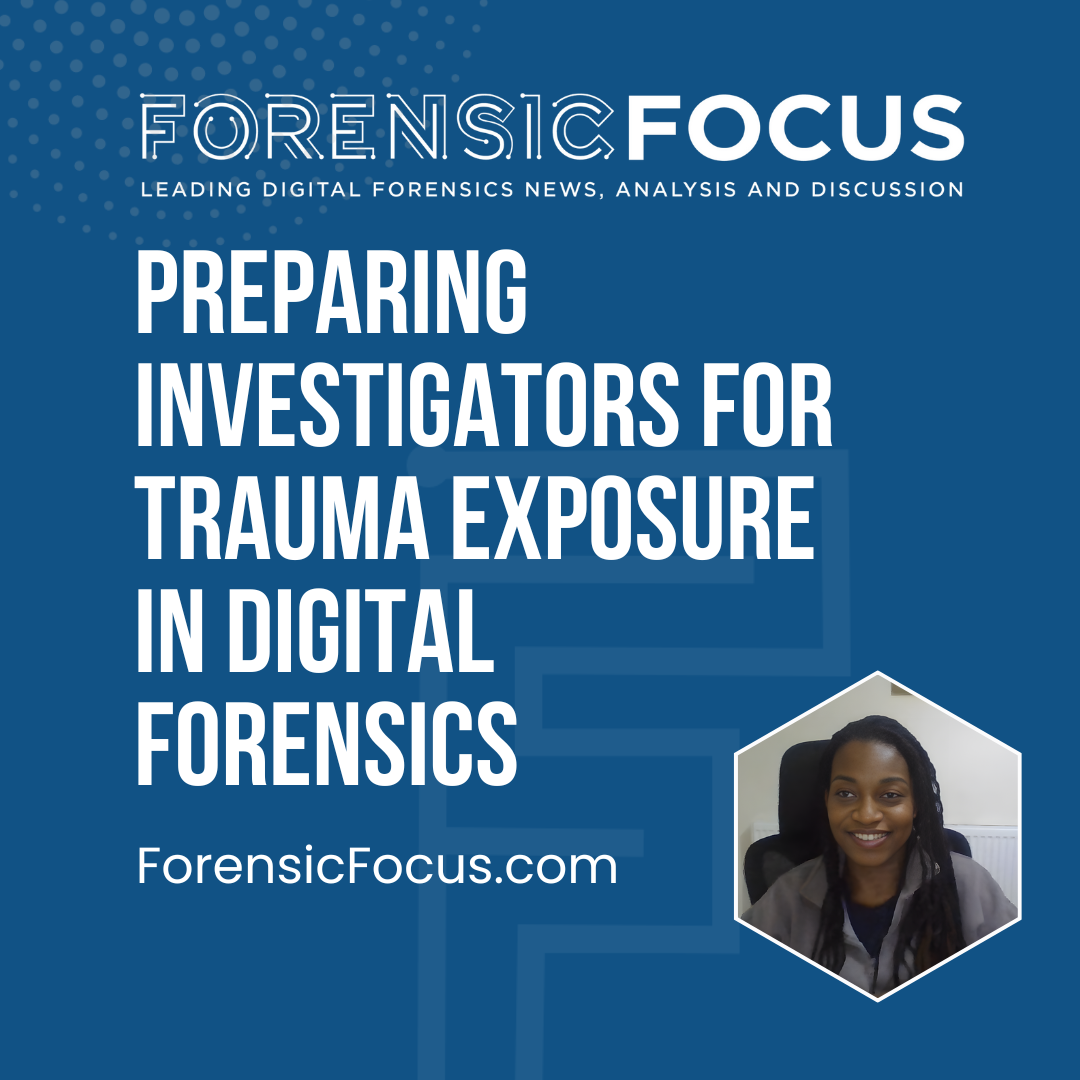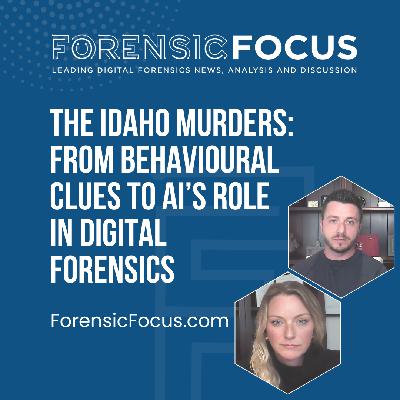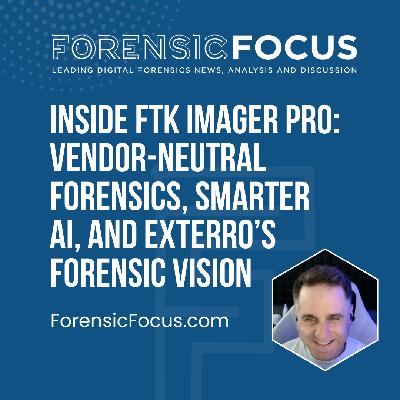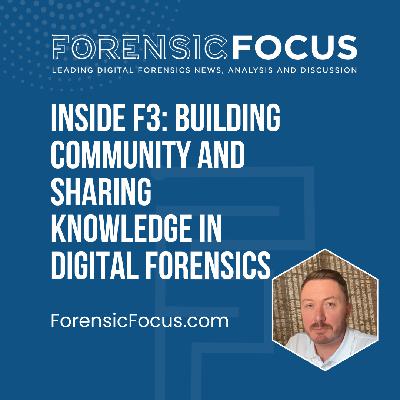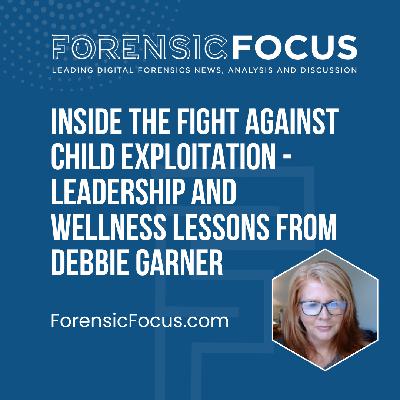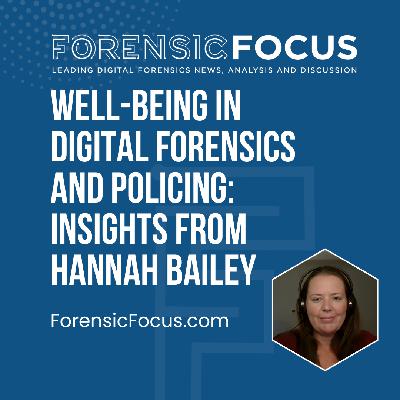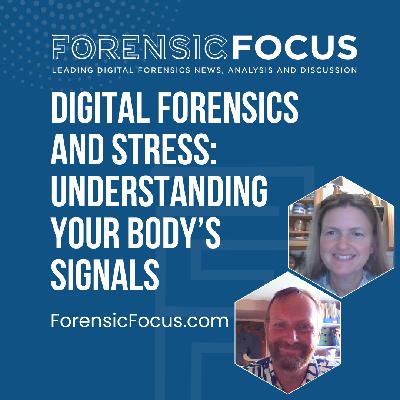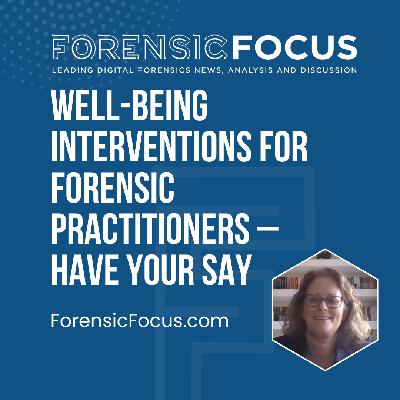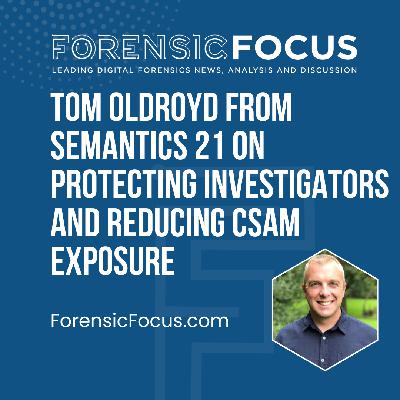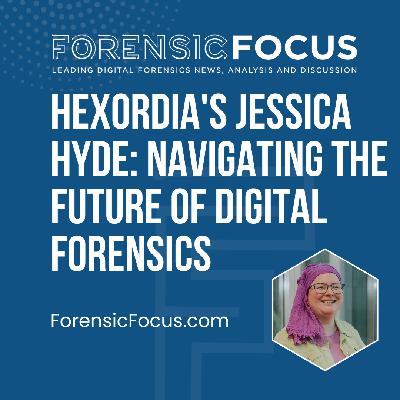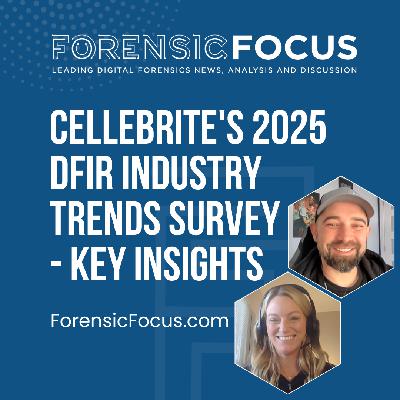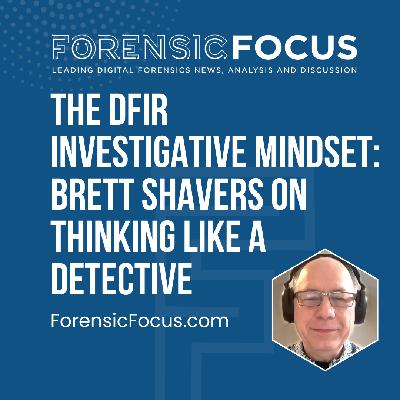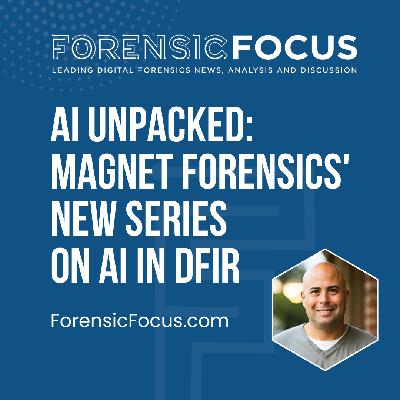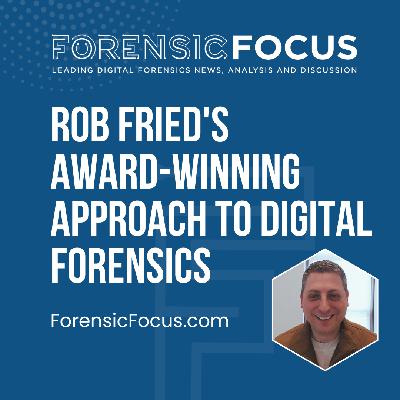Discover Forensic Focus
Forensic Focus

115 Episodes
Reverse
📝 Complete the Forensic Focus International Well-Being Study: https://www.forensicfocus.com/survey Bunmi Bloom, co-founder of Sena Forensics, joins the Forensic Focus Podcast to discuss the emotional reality of working in digital forensics and the psychological toll of long-term exposure to traumatic material. Drawing on her background with the Metropolitan Police and the Financial Conduct Authority, Bunmi reflects on how DFIR practitioners navigate disturbing images, case reports, and the pressure to "stay strong and get on with it." The conversation explores coping mechanisms inside the lab, the vital role of social support, and how desensitisation can develop over time. Bunmi shares why many investigators feel unable to speak openly, how team culture shapes resilience, and what better preparation for new DFIs could look like. She also considers whether psychological screening, mentoring, and leadership-driven change could help create safer, more supportive forensic workplaces. #digitalforensics #DFIR #MentalHealth #Wellbeing #Policing #CSAM 00:00 Introducing Bunmi Bloom 00:39 Sena Forensics: Mission and Services 03:44 Professional Background 05:35 The Impactful LinkedIn Post 07:50 Emotional Challenges in Digital Forensics 10:55 Coping Mechanisms and Social Support 15:20 Desensitization and Emotional Detachment 18:39 Preparation and Support for New DFIs 22:56 The Importance of Recognizing Stressors 25:16 The Role of Social Support 28:27 Cultural Shifts in Mental Health Awareness 31:53 Psychological Screening in Recruitment 38:53 Systemic Change and Leadership 41:20 Final Thoughts and Recommendations 👉 Visit Forensic Focus: https://www.forensicfocus.com 🎧 Video/Transcript: https://www.forensicfocus.com/podcast/preparing-investigators-for-trauma-exposure-in-digital-forensics/ 📝 Show Notes Sena Forensics on LinkedIn - https://www.linkedin.com/in/sena-forensics-bunmi-bloom-76a592374/ Forensic Focus International Well-Being Study - https://www.forensicfocus.com/survey 👉 Follow Forensic Focus RSS | https://www.forensicfocus.com/feed YouTube | https://youtube.com/@ForensicFocus Podcast | https://forensicfocus.com/podcast LinkedIn Page | https://linkedin.com/company/forensicfocus LinkedIn Group | https://linkedin.com/groups/693917 X (Twitter) | https://x.com/ForensicFocus Facebook | https://facebook.com/forensicfocus Bluesky | https://bsky.app/profile/forensicfocus.bsky.social Instagram | https://instagram.com/forensicfocus TikTok | https://tiktok.com/@forensicfocus Mastodon | https://dfir.social/@forensicfocus
📝 Take The Surveys An Exploratory Study of Covert Cyber Investigators and the Psychological Factors Impacting on Personal Resilience and Investigative Decision-Making https://hud.eu.qualtrics.com/jfe/form/SV_3gwyXAR281cY12C Forensic Focus International Well-Being Study https://www.forensicfocus.com/survey Carol Brooks, a cyber and organisational psychologist and leadership consultant, joins the Forensic Focus Podcast to discuss her PhD research into covert cyber investigators and the psychological factors that shape their resilience and investigative decision-making. She explains what it really means to work "covertly" online and why inconsistent job titles across law enforcement, cybersecurity and the private sector make it difficult even to define the workforce she is studying. The conversation explores the significant challenges involved in recruiting participants — from suspicion and cultural barriers to the difficulties of engaging freelancers and small teams — and highlights why anonymity and ethical oversight are critical to building trust. It also examines the importance of bridging the gap between academia and industry if research is to have real-world impact, before concluding with a call for covert cyber investigators worldwide to take part in the study and help give this hidden workforce a much-needed voice. #DigitalForensics #DFIR #CyberPsychology #InvestigatorWellbeing #CovertInvestigations #mentalhealth 00:00 Introducing Carol Brooks 02:05 Carol's PhD Journey and Research Focus 06:49 Understanding Covert Cyber Investigators 13:11 Challenges in Recruiting Participants 27:18 Psychological Factors in Cyber Investigations 29:54 Setting PhD Goals and Challenges 31:02 Connecting with Covert Investigators 32:25 Overcoming Suspicion and Misconceptions 33:26 Strategies for Accessing Networks 36:37 Supporting Investigator Wellbeing 46:55 Bridging Academia and Industry 52:50 Balancing PhD and Personal Life 58:36 Call to Action for Covert Investigators 👉 Visit Forensic Focus: https://www.forensicfocus.com 🎧 Video/Transcript: https://www.forensicfocus.com/podcast/covert-cyber-investigator-well-being-with-carol-brooks/ 📝 Show Notes An Exploratory Study of Covert Cyber Investigators and the Psychological Factors Impacting on Personal Resilience and Investigative Decision-Making - https://hud.eu.qualtrics.com/jfe/form/SV_3gwyXAR281cY12C British Psychological Society Cyber Psychology Section – https://www.bps.org.uk Forensic Focus International Well-Being Study - https://app.onlinesurveys.jisc.ac.uk/s/northumbria/forensic-focus-wellbeing-survey 👉 Follow Forensic Focus RSS | https://www.forensicfocus.com/feed YouTube | https://youtube.com/@ForensicFocus Podcast | https://forensicfocus.com/podcast LinkedIn Page | https://linkedin.com/company/forensicfocus LinkedIn Group | https://linkedin.com/groups/693917 X (Twitter) | https://x.com/ForensicFocus Facebook | https://facebook.com/forensicfocus Bluesky | https://bsky.app/profile/forensicfocus.bsky.social Instagram | https://instagram.com/forensicfocus TikTok | https://tiktok.com/@forensicfocus Mastodon | https://dfir.social/@forensicfocus
Phil Anderson from Northumbria University joins the Forensic Focus Podcast to discuss the launch of the Forensic Focus International Well-Being Study — a global research project examining the psychological and physical impact of digital forensic work across both law enforcement and the private sector. Drawing on his 24-year academic career and long-standing collaboration with Northumbria Police, Phil explains how digital forensics units have evolved and why DFIs are facing unprecedented levels of stress, burnout, and workload pressure. Together with host Paul, he outlines the four core research themes behind the study — early-life trauma and resilience, the mind-body impact of occupational stress, organisational protective factors, and the role of neurodiversity — and issues a clear call to action for DFIs worldwide to take part and help drive meaningful change. #DigitalForensics #DFIR #ForensicWellbeing #DFIs #MentalHealth #Neurodiversity #Trauma #PoliceForensics 00:00 Phil Anderson's Journey into Digital Forensics 01:34 Collaboration with Northumbria Police 02:33 The Evolution of Digital Forensics Units 03:34 Planning the Forensic Focus Well-Being Study 11:40 Exploring the Impact of Early Life Trauma on DFIs 19:51 Coping Strategies and Physical Health in DFIs 24:37 Challenges and Stressors in Digital Forensics 27:51 Challenges in Digital Forensics 28:42 Recruitment and Retention Issues 30:18 Acknowledging the Crisis 33:34 Protective Factors Against Trauma 44:08 Neurodiversity in Digital Forensics 47:46 Call to Action: Participate in the Survey 👉 Visit Forensic Focus at https://www.forensicfocus.com 🎧 Video/Transcript: https://www.forensicfocus.com/podcast/forensic-focus-international-well-being-study-have-your-say/ 📝 Show Notes Forensic Focus International Well-Being Study - https://app.onlinesurveys.jisc.ac.uk/s/northumbria/forensic-focus-wellbeing-survey Forensic Focus and Northumbria University Launch International Well-Being Study for Digital Forensic Investigators - https://www.forensicfocus.com/news/forensic-focus-and-northumbria-university-launch-international-well-being-study-for-digital-forensic-investigators/ 👉 Follow Forensic Focus RSS | https://www.forensicfocus.com/feed YouTube | https://youtube.com/@ForensicFocus Podcast | https://forensicfocus.com/podcast LinkedIn Page | https://linkedin.com/company/forensicfocus LinkedIn Group | https://linkedin.com/groups/693917 X (Twitter) | https://x.com/ForensicFocus Facebook | https://facebook.com/forensicfocus Bluesky | https://bsky.app/profile/forensicfocus.bsky.social Instagram | https://instagram.com/forensicfocus TikTok | https://tiktok.com/@forensicfocus Mastodon | https://dfir.social/@forensicfocus
Si and Desi close out the year on the Forensic Focus Podcast with a wide-ranging end-of-2025 wrap-up, reflecting on how the year unfolded for the show and the DFIR community. They discuss the mental health series, guest appearances, and how everyday technologies — from streaming services to wearables — are increasingly intersecting with forensic investigations, even when people don't realise it. The conversation then broadens to bigger technology shifts, including the rapid rise of AI and its legal, ethical, and societal implications. Si and Desi explore bias, misinformation, validation, and why human oversight still matters, before turning to the resurgence of operating system "wars," Apple's growing market share, Linux's expanding presence, and what changing user behaviour could mean for digital forensics in the years ahead. #DigitalForensics #DFIR #ForensicFocusPodcast #AI #Wearables #Linux #Apple 👉 Visit Forensic Focus: https://www.forensicfocus.com ⏱️ Timestamps 00:00 Welcome to the Forensic Focus Podcast 00:33 Reflecting on the Year 2025 01:32 Challenges and Changes in 2025 02:09 Mental Health Series and Guest Appearances 04:51 Streaming Services and TV Licenses 09:27 Wearable Technology and Forensics 18:11 AI in Legal and Ethical Contexts 44:20 AI's Inevitable Rise 44:37 The Resurgence of Operating System Wars 45:19 Apple's Growing Market Share 46:31 Linux's Increasing Presence 53:14 Challenges for Linux Adoption 01:02:31 The Shift to Mobile and Tablet Usage 01:14:49 AI-Generated Content and Its Implications 01:21:50 Reflections on Free Speech and AI 01:27:57 Looking Ahead to the Future 🎧 Video/Transcript: https://www.forensicfocus.com/podcast/si-and-desis-holiday-special-2025/ 📝 Show Notes Forensic Focus Podcasts - https://www.forensicfocus.com/podcast Forensic Focus Jobs Board - https://www.forensicfocus.com/jobs 'The old-school landline is having a cultural moment', ABC - https://www.abc.net.au/news/2025-11-16/landline-rotary-phone-social-media-ban-family-connect/106010638 'Judges have become 'human filters' as AI in Australian courts reaches 'unsustainable phase', chief justice says', The Guardian - https://www.theguardian.com/law/2025/nov/21/judges-have-become-human-filters-as-ai-in-australian-courts-reaches-unsustainable-phase-chief-justice-says 'Founder Admits His "AI Transcription" Startup Was Just Him Joining People's Meetings and Taking Notes by Hand', Futurism - https://futurism.com/artificial-intelligence/fireflies-founder-startup-ai 'Man Alarmed to Discover His Smart Vacuum Was Broadcasting a Secret Map of His House', Futurism - https://futurism.com/robots-and-machines/robot-vacuum-broadcasting 👉 Follow Forensic Focus RSS | https://www.forensicfocus.com/feed YouTube | https://youtube.com/@ForensicFocus Podcast | https://forensicfocus.com/podcast LinkedIn Page | https://linkedin.com/company/forensicfocus LinkedIn Group | https://linkedin.com/groups/693917 X (Twitter) | https://x.com/ForensicFocus Facebook | https://facebook.com/forensicfocus Bluesky | https://bsky.app/profile/forensicfocus.bsky.social Instagram | https://instagram.com/forensicfocus TikTok | https://tiktok.com/@forensicfocus Mastodon | https://dfir.social/@forensicfocus
Keith Lockhart from Oxygen Forensics joins Si and Desi on the Forensic Focus Podcast to examine how remote digital evidence collection is changing investigative workflows across DFIR, eDiscovery, and corporate investigations. Drawing on recent XiB mobile training and real-world deployments, Keith explains where remote and agent-based acquisition delivers practical benefits—and where traditional hands-on methods remain essential. The discussion covers targeted versus full acquisitions, consent and governance in corporate environments, and the operational realities of collecting data across networks, jurisdictions, and time zones. It also explores over-the-air mobile collection, workstation memory capture, drone forensics, and why parser development remains a constant challenge as apps and platforms evolve. #DigitalForensics #DFIR #MobileForensics #IncidentResponse #eDiscovery #RemoteCollection #DigitalEvidence #cybercrime 👉 Visit Forensic Focus at https://www.forensicfocus.com ⏱️ Timestamps 00:00 Welcoming Keith from Oxygen 01:59 Discussing the XiB Course Experience 05:19 Challenges and Successes in Mobile Phone Extraction 10:22 Remote Collection and Its Evolution 14:38 ROI and Practical Applications of Remote Collection 30:32 Remote Collection in Corporate and Law Enforcement 35:01 Parole Monitoring Challenges 35:20 Case Study: Faulty Monitoring Software 36:34 The Need for Reliable Monitoring Tools 37:23 Cross-Border Data and Legal Concerns 38:02 Chain of Custody in Law Enforcement 39:26 Remote Acquisition and Targeted Data Collection 41:33 Corporate Use Cases and Data Management 51:04 Drone Acquisition and Challenges 01:00:34 Concluding Thoughts and Future Developments 🎥 Video/Transcript – https://www.forensicfocus.com/podcast/oxygen-forensics-on-smarter-faster-remote-dfir-collections/ 📝 Show Notes Oxygen Forensics – https://www.oxygenforensics.com/ Review: Oxygen Forensics Training – Extraction in a Box (XiB) – https://www.forensicfocus.com/reviews/oxygen-forensics-training-extraction-in-a-box-xib/ 👉 Follow Forensic Focus RSS | https://www.forensicfocus.com/feed/ YouTube | https://youtube.com/@ForensicFocus Podcast | https://forensicfocus.com/podcast LinkedIn Page | https://linkedin.com/company/forensicfocus LinkedIn Group | https://linkedin.com/groups/693917 X | https://x.com/ForensicFocus Facebook | https://facebook.com/forensicfocus Bluesky | https://bsky.app/profile/forensicfocus.bsky.social Instagram | https://instagram.com/forensicfocus TikTok | https://tiktok.com/@forensicfocus Mastodon | https://dfir.social/@forensicfocus Website | https://www.forensicfocus.com
Heather and Jared Barnhart return to the Forensic Focus Podcast for a wide-ranging conversation covering Cellebrite's growing Case-to-Closure Summit, behind-the-scenes insights from building one of the industry's toughest CTFs, and their digital forensic work on one of the most high-profile US murder cases in recent years. They share why the C2C Summit focuses on practitioner-led talks rather than product pitches, what made the first event such a success, and what's planned for the next gathering — including expanded training and a keynote from Terry Crews. The discussion also dives into how they design complex CTFs, why intentionally frustrating questions teach critical thinking, and how their mobile forensics analysis helped reveal behavioural patterns, intent, and attempts to hide activity in the Idaho murders investigation. They finish by exploring the future of investigations and AI — from cautious, evidence-bounded implementations to the importance of validation and avoiding confirmation bias. Get 50% off Cellebrite C2C User Summit 2026 registration with promo code: 2026-c2c-ForensicFocus #DigitalForensics #DFIR #MobileForensics #Cellebrite #CTF #incidentresponse #ForensicFocus #AIForensics 00:00 Introduction and Guest Introductions 01:33 C2C Summit Overview 03:35 C2C Summit Success and Highlights 09:45 Challenges and Insights from CTF 19:56 Introduction to the Idaho Murders Case 25:10 The Slow Process of Justice 25:53 Key Evidence: The Knife Sheath and the Car 27:46 Digital Footprint and Intent 28:58 Challenges in Mobile Forensics 31:49 Behavioral Patterns and Digital Evidence 42:30 AI in Forensics 43:17 Future of Digital Investigations 44:00 The Role of AI in Investigations 50:52 Validation and Confirmation Bias 54:24 Closing Remarks and Future Plans 👉 Visit Forensic Focus: https://www.forensicfocus.com 🎧 Episode Page & Transcript: https://www.forensicfocus.com/podcast/the-idaho-murders-from-behavioural-clues-to-ais-role-in-digital-forensics/ 📝 Show Notes Cellebrite – https://www.cellebrite.com Cellebrite C2C User Summit 2026 – https://events.cellebritec2c.com/event/2026/overview CFReDS – https://cfreds.nist.gov/ SANS DFIR Summit & Training 2026 – https://www.sans.org/cyber-security-training-events/digital-forensics-summit-2026 👉 Follow Forensic Focus RSS | https://www.forensicfocus.com/feed YouTube | https://youtube.com/@ForensicFocus Podcast | https://forensicfocus.com/podcast LinkedIn Page | https://linkedin.com/company/forensicfocus LinkedIn Group | https://linkedin.com/groups/693917 X (Twitter) | https://x.com/ForensicFocus Facebook | https://facebook.com/forensicfocus Bluesky | https://bsky.app/profile/forensicfocus.bsky.social Instagram | https://instagram.com/forensicfocus TikTok | https://tiktok.com/@forensicfocus Mastodon | https://dfir.social/@forensicfocus
Justin Tolman from Exterro joins the Forensic Focus Podcast to talk about the future of FTK and the role FTK Imager still plays in everyday casework. He explains why the original free version remains available, and what prompted the introduction of Imager Pro with added capabilities like BitLocker decryption and iOS collections. Justin also reflects on his time in law enforcement and training, and why the investigative side of the work still holds a strong pull. Looking ahead, Justin shares where FTK development is headed — from large-scale processing and streamlined review workflows to Whisper-based audio transcription and careful, targeted use of AI for tasks like summarising long documents and cross-media searching. He also previews Exterro's upcoming Inform event — a 15-hour global broadcast featuring talks from practitioners around the world — and invites the community to get involved. #DigitalForensics #DFIR #FTK #Exterro #ForensicImaging #MobileForensics #IncidentResponse 00:00 Welcome to the Forensic Focus Podcast 00:31 Introducing Justin Tolman from Exterro 01:46 Justin's Journey into Forensics 03:10 Transition to Training and Exterro 06:31 FTK Imager Pro: Features and Benefits 14:36 Training and Community Resources 16:29 Updates on FTK Suite and Scalability 19:10 On-Prem vs. Cloud Solutions 26:57 AI in Forensics: Benefits and Challenges 37:45 Addressing AI Bias in Forensics 38:53 Case Study: AI Misinterpretation in Seattle Shooting 40:14 The Importance of Validation in AI Forensics 41:18 Challenges in Identifying Legal vs. Illegal Content 43:08 The Future of AI in Forensics 44:18 Collaboration and Integration in Forensic Tools 46:07 The Role of APIs and Open Standards 47:18 Challenges with Proprietary Forensic Formats 54:36 The Need for High Compression Formats 56:32 Forensic Focus Podcast and Community Engagement 01:00:56 Upcoming Forensic Events and Presentations 01:06:23 Conclusion and Final Thoughts 👉 Visit Forensic Focus: https://www.forensicfocus.com 🎧 Video/Transcript: https://www.forensicfocus.com/podcast/inside-ftk-imager-pro-vendor-neutral-forensics-smarter-ai-and-exterros-forensic-vision/ 📝 Show Notes Exterro – https://www.exterro.com FTK Imager PRO –https://www.exterro.com/digital-forensics-software/ftk-imager-pro Exterro Inform – https://www.exterro.com/resources/exterro-inform FTK Podcasts – https://www.exterro.com/resources/ftk-over-the-air-podcast OpenAI Whisper (speech-to-text) – https://github.com/openai/whisper Ollama (local LLM framework) – https://ollama.ai Project VIC – https://www.projectvic.org CAID (UK) – https://www.gov.uk/government/publications/child-abuse-image-database 👉 Follow Forensic Focus RSS | https://www.forensicfocus.com/feed YouTube | https://youtube.com/@ForensicFocus Podcast | https://forensicfocus.com/podcast LinkedIn Page | https://linkedin.com/company/forensicfocus LinkedIn Group | https://linkedin.com/groups/693917 X (Twitter) | https://x.com/ForensicFocus Facebook | https://facebook.com/forensicfocus Bluesky | https://bsky.app/profile/forensicfocus.bsky.social Instagram | https://instagram.com/forensicfocus TikTok | https://tiktok.com/@forensicfocus Mastodon | https://dfir.social/@forensicfocus
Gareth Davies, Chairman of F3 (First Forensic Forum), joins the Forensic Focus Podcast to explore how a grassroots, vendor-neutral community has helped shape digital forensics in the UK for three decades. He traces F3's origins in the 1990s, when affordable training and tool-agnostic knowledge-sharing were scarce, and explains why the forum still focuses on byte-level, lab-ready techniques over sales pitches. Looking ahead, Gareth previews F3's 2025 conference in Warwickshire (Nov 18–20), the not-for-profit pricing model, and upcoming trainings on UAVs, software-defined radio, implants/biomed devices, smartwatch and vehicle forensics, and video authentication/deepfakes. He also discusses international growth (including interest in an Australian chapter) and an open call for volunteers to help run events and keep training affordable. #DigitalForensics #DFIR #ForensicsTraining #IncidentResponse #VehicleForensics #CryberCrime #DigitalEvidence #DigitalInvestigtion #DigitalEvidence 👉 Visit Forensic Focus at https://www.forensicfocus.com 00:00 Introducing Gareth Davies 01:09 What is F3? 03:01 Gareth's Journey into Forensics 05:35 PhD and Research Work 06:54 Current Role and Responsibilities 09:08 Interesting Cases and Projects 12:27 Involvement with F3 14:41 F3's Global Reach and Community 20:03 Challenges and Future of F3 22:39 Personal Experiences and Networking 24:47 Becoming Chairman of F3 30:50 Upcoming F3 Event Details 35:28 Digital Forensics Teaching and Research 37:30 Upcoming F3 Training 42:38 Challenges in Digital Forensics 45:28 The Importance of Community and Resources 55:04 Personal Interests and Hobbies 57:46 Conclusion and Final Thoughts 🎥 Video/Transcript – https://www.forensicfocus.com/podcast/inside-f3-building-community-and-sharing-knowledge-in-digital-forensics/ 📝 Show Notes F3 – First Forensic Forum website - https://f3.org.uk F3 – First Forensic Forum LinkedIn - https://www.linkedin.com/company/f3.org.uk/ Spyder Forensics - https://www.spyderforensics.com Bénédictine - https://en.wikipedia.org/wiki/B%C3%A9n%C3%A9dictine APOLLO - https://github.com/mac4n6/APOLLO DFRWS - https://dfrws.org GCK File Signature Table - https://filesig.search.org NIST - https://www.nist.gov/itl/ssd/digital-forensics 👉 Follow Forensic Focus here: RSS | https://www.forensicfocus.com/feed/ YouTube | https://youtube.com/@ForensicFocus Podcast | https://forensicfocus.com/podcast LinkedIn Page | https://linkedin.com/company/forensicfocus LinkedIn Group | https://linkedin.com/groups/693917 X | https://x.com/ForensicFocus Facebook | https://facebook.com/forensicfocus Bluesky | https://bsky.app/profile/forensicfocus.bsky.social Instagram | https://instagram.com/forensicfocus TikTok | https://tiktok.com/@forensicfocus Mastodon | https://dfir.social/@forensicfocus Website | https://www.forensicfocus.com
Debbie Garner, retired Special Agent in Charge at the Georgia Bureau of Investigation, joins the Forensic Focus Podcast to share insights from her 30-year career. From undercover narcotics work in her early 20s to leading Georgia's Internet Crimes Against Children (ICAC) Task Force, Debbie brings a unique perspective on collaboration, child protection, and investigator wellness. She discusses the challenges of cyber tips backlogs, the importance of cross-border cooperation, and why well-being must be built into the culture of child exploitation investigations. Debbie explains how she introduced practical, budget-conscious wellness initiatives — from group discussions to peer support and mental health check-ins — and how these efforts helped transform trust, retention, and resilience within her unit. Debbie and Paul also explore the stigma investigators often face, how leadership decisions can make or break support for officers, and what agencies can do to better safeguard the people safeguarding children. #DigitalForensics #DFIR #WellBeing #LawEnforcement #childprotection 👉 Visit Forensic Focus at https://www.forensicfocus.com 00:00 Introduction and Guest Background 00:49 Early Career in Law Enforcement 02:11 Specialization in Child Exploitation and Computer Crimes 03:27 Challenges and Changes in Law Enforcement 06:03 The ICAC Task Force Program 09:34 Cross-Border Investigations and Cooperation 14:46 Wellness and Resiliency in Law Enforcement 18:01 Building a Culture of Wellness 28:16 Personal Stories and Agency Support 39:57 Final Thoughts and Advice 🎥 Video/Transcript - https://www.forensicfocus.com/podcast/inside-the-fight-against-child-exploitation-leadership-and-wellness-lessons-from-debbie-garner/ 📝 Show Notes Innocent Justice Foundation - https://innocentjustice.org Raven (ICAC Task Force Funding Advocacy) - https://raven.us Hexordia - https://www.hexordia.com 👉 Follow Forensic Focus here: RSS | https://www.forensicfocus.com/feed YouTube | https://youtube.com/@ForensicFocus Podcast | https://forensicfocus.com/podcast LinkedIn Page | https://linkedin.com/company/forensicfocus LinkedIn Group | https://linkedin.com/groups/693917 X | https://x.com/ForensicFocus Facebook | https://facebook.com/forensicfocus Bluesky | https://bsky.app/profile/forensicfocus.bsky.social Instagram | https://instagram.com/forensicfocus TikTok | https://tiktok.com/@forensicfocus Mastodon | https://dfir.social/@forensicfocus Website | https://www.forensicfocus.com
Hannah Bailey, founder of Blue Light Wellbeing, joins the Forensic Focus Podcast to share her powerful journey from frontline policing to becoming a psychotherapist, trauma therapist, and well-being coach. Drawing on 15 years in the police — including CID and major crime — Hannah brings unique cultural credibility to her work supporting digital forensics professionals, first responders, and other high-risk roles. She talks openly about living with PTSD and burnout, facing two breast cancer diagnoses, and how those experiences inspired her to focus on proactive mental health support. Hannah and Paul discuss why cultural awareness in therapy matters, how approaches like psychoeducation and regular supervision can help, and why therapy isn't just for people who are "broken." Hannah also explains BrainWorking Recursive Therapy (BWRT), a modern trauma therapy that transformed her own recovery, and shares practical advice for those in digital forensics and other trauma-facing roles on spotting early signs of stress and building long-term resilience. #DigitalForensics #DFIR #MentalHealth #WellBeing #PTSD 00:00 Introduction 02:44 Hannah Bailey's Background and Career 04:08 The Onset of Mental Health Challenges 06:01 Breast Cancer Diagnosis and Its Impact 06:37 Returning to Policing and Further Challenges 09:44 Lack of Support 12:14 Proactive Mental Health Approaches 17:18 Hannah's Work with DFIs and Other Forces 20:22 The Importance of Early Intervention 26:28 The Value of Therapy in Organizations 27:35 The Importance of Culturally Aware Therapists 29:29 Introduction to Brain Work Recursive Therapy (BWRT) 33:52 Combining Trauma Therapy and Wellbeing Coaching 34:32 The Therapeutic Process and Its Benefits 36:21 Supervision and Support in Therapy 36:57 Proactive Approaches in Digital Forensics 39:11 Building Trust and Non-Judgmental Spaces 43:30 Final Thoughts 🎥 Video/Transcript - https://www.forensicfocus.com/podcast/well-being-in-digital-forensics-and-policing-insights-from-hannah-bailey/ 📝 Show Notes Blue Light Wellbeing - https://www.bluelightwellbeing.uk 👉 Follow us here: RSS | https://www.forensicfocus.com/feed/ Youtube | https://youtube.com/@UCQajlJPesqmyWJDN52AZI4Q Podcast | https://forensicfocus.com/podcast LinkedIn Page | https://linkedin.com/company/forensicfocus LinkedIn Group | https://linkedin.com/groups/693917 X | https://x.com/ForensicFocus Facebook | https://facebook.com/forensicfocus Bluesky | https://bsky.app/profile/forensicfocus.bsky.social Instagram | https://instagram.com/forensicfocus TikTok | https://tiktok.com/@forensicfocus Mastodon | https://dfir.social/@forensicfocus Website | https://www.forensicfocus.com
Dr Zoe Billings and Mark Pannone from Adapt & Evolve join Paul to discuss their unique approach to mental health and well-being in digital forensics. Dr Billings is a biologist and former senior investigator, while Mark is a former Assistant Chief Constable. Together they've developed a model that focuses on recognising the early biological signs of stress rather than waiting for mental health problems to develop. They discuss how stress shows up physically in the body, why many digital forensic investigators feel unheard in their organisations, and why standard well-being support often doesn't work in law enforcement. The conversation covers practical stress reduction techniques and how understanding what stress does to your body can help people spot problems early. Mark and Zoe have worked with various organisations including the FBI, using their combined decades of police and investigative experience to provide support that actually fits the culture of law enforcement and forensic work. #DigitalForensics #CyberInvestigation #DFIR #Wellbeing 00:00 Introduction 00:22 Spotlight on Mental Health in Digital Forensics 00:59 Meet the Experts: Dr. Zoe Billings and Mark Pannone 01:39 The Origins of Adapt & Evolve 03:48 Biological Aspects of Stress 04:57 Implementing Preventative Measures 09:05 Leadership and Organizational Challenges 20:01 Physical Ailments from Stress 26:09 Cultural Awareness in Law Enforcement 31:45 ISO Standards and Legal Obligations 39:32 Conclusion and Final Thoughts Show Notes Adapt & Evolve - https://www.adaptandevolve.co.uk/
Dr Jo Morrissey joins Paul to discuss her research into wellbeing challenges faced by forensic practitioners worldwide. As Workforce Strategy Lead at the Forensic Capability Network, Dr Morrissey is conducting a comprehensive study examining mental health impacts across all forensic disciplines - from digital forensics to crime scene investigation, DNA analysis, and fingerprint examination. They explore the unique psychological pressures forensic practitioners face, including exposure to traumatic material, working in isolation, and the barriers that prevent many from seeking help. Dr Morrissey discusses how stigma around help-seeking behavior and fears about career prospects continue to affect practitioners, and why evidence-based national guidelines are urgently needed. Take part in the research: Dr Morrissey is seeking responses from current and former forensic practitioners worldwide across all disciplines and sectors. The survey examines well-being challenges, available interventions, and their effectiveness. Your participation could help shape future well-being support for the forensic community. Survey closes Friday 4th July 2025. Survey link: https://forms.office.com/e/GXPMwnpyMi #ForensicScience #MentalHealth #Wellbeing #DigitalForensics 00:00 Introduction to Dr. Jo Morrissey 01:31 Overview of the Wellbeing Study 03:34 Challenges Faced by Forensic Practitioners 08:25 Survey Specifics and Goals 14:57 Barriers and Stigma in Wellbeing 18:49 Ethical Considerations and Future Research 20:09 Open Access to Research Report 20:38 National Guidelines for Wellbeing 22:00 Challenges in Implementing Guidelines 25:07 Importance of Survey Participation 27:02 Potential for Funding and Further Research 28:06 Exploring Differences in Wellbeing 30:51 Impact of Experience and Culture on Wellbeing 33:39 Resilience and Adverse Childhood Experiences 37:05 Closing Remarks and Future Research
Host Paul Gullon-Scott sits down with Tom Oldroyd, Director of Strategy and Sales at Semantics 21, to discuss S21's digital forensics platform that prioritizes investigator mental health alongside cutting-edge technology. Drawing on his 17 years in policing and experience running a digital forensic unit, Tom highlights the psychological toll on investigators exposed to disturbing content daily, arguing it's one of the most challenging yet underrecognized jobs in policing. Tom highlights Semantics 21's innovative solutions, including their Global Alliance Database with 3.1 billion hashes that can pre-label up to 70% of evidence automatically, AI-powered victim rescue tools, and their groundbreaking features to track investigator exposure levels in real-time. Tom demonstrates protective features like mandatory break reminders, privacy overlays, and decompression videos designed to help investigators manage psychological impact. #DigitalForensics #CyberInvestigation #DFIR #AI #Wellbeing 00:00 Introduction 00:30 Showcasing Semantics 21: Innovation in Digital Forensics 00:40 Protecting Investigator Wellbeing 01:53 Meet Tom Oldroyd 02:56 Challenges in Digital Forensics 06:02 The Growing Threat of Digital Crime 07:38 Global Collaboration and Technology 08:48 Introducing S21 LASERi-X 09:33 The Power of AI and Databases 12:23 Global Alliance Database: A Game Changer 16:52 Efficiency and Investigator Wellbeing 21:11 Advanced Features and Workflow 27:51 Tracking Exposure Levels with Semantics 21 28:20 Monitoring Well-Being 29:13 Handling Large Volumes of Data 30:24 Threshold System and Victim Rescue 32:27 Efficient Data Import and Grading 33:27 Global Alliance Database and Photo DNA 36:32 Wellbeing Features and Stress Management 44:00 Cross-Company Collaboration and Data Sharing 45:38 Pricing and Accessibility of Semantics 21 47:54 User Feedback and Customization 51:12 AI Location Prediction Technology 53:42 Conclusion and Contact Information Show Notes Semantics 21 - https://www.semantics21.com Semantics 21 Articles on Forensic Focus - https://www.forensicfocus.com/author/semantics21
Jessica Hyde from Hexordia joins the Forensic Focus Podcast to discuss her unique journey from Marine Corps avionics technician to digital forensics expert. Jessica shares how her military background provided transferable skills for forensic investigations, emphasizing the importance of documentation, troubleshooting, and diverse perspectives in finding truth in digital evidence. The conversation explores critical topics including IoT forensics challenges, the urgent need for timely data acquisition before evidence degrades, and the role of AI in forensic analysis. Jessica also discusses her experience teaching at George Mason University since 2016, how students' questions enhance her own knowledge, and why interdisciplinary teams create better forensic outcomes. With candid reflections on maintaining perspective while handling difficult cases and thoughts on the future challenges of policy and law keeping pace with technology, this episode offers valuable insights for both seasoned professionals and those new to digital forensics. #DigitalForensics #MobileForensics #CyberInvestigation #DFIR #AI 00:00 Introduction and Guest Welcome 01:02 Jessica Hyde's Unique Career Path 03:06 Transition to Digital Forensics 13:17 Teaching and Learning in Digital Forensics 20:12 Hands-On Forensics and IoT Devices 24:19 The Importance of Interdisciplinary Teams 27:12 Humor and Levity in Forensics 29:38 The Role of Cyber Investigators 31:07 Bias in Cyber Investigations 32:01 Generational Perspectives in Technology 33:51 Privacy Concerns in Digital Forensics 36:53 The Importance of Timely Data Acquisition 44:28 Challenges with AI in Digital Forensics 54:42 Policy and Legal Challenges in Digital Forensics 56:56 Conclusion and Final Thoughts Show Notes Hexordia - https://www.hexordia.com George Mason University - https://dfor.gmu.edu/person/jessica-l-hyde SWGDE - https://www.swgde.org
Heather Barnhart and Paul Lorenz join the Forensic Focus Podcast to discuss key insights from Cellebrite's 2025 DFIR Industry Trends Survey. They dive into the challenges facing digital forensics today - from locked devices and encrypted applications to overwhelming case backlogs. The survey, which gathered responses from over 2,100 professionals across 95 countries, reveals notable trends: 98% of prosecutors consider digital evidence critical to their cases, and 80% of respondents believe AI can enhance investigation effectiveness. The discussion delves into the growing acceptance of cloud storage in forensics, the cautious adoption of AI in investigations, and the preference for in-person training despite the convenience of online options. The guests also discuss cognitive bias in investigations and the importance of maintaining forensic integrity when presenting digital evidence. #digitalforensics #dfir 00:00 Welcome and Introductions 00:56 Paul Lorenz's Journey into Forensics 03:19 Challenges in Digital Forensics 04:36 Industry Trends and Survey Insights 06:37 Mental Health and Community Support 17:19 AI in Digital Investigations 22:57 Case Studies and Real-World Examples 27:37 Diverse Paths in Investigations 28:07 Challenges of Bias in Forensic Cases 30:33 The Complexity of Cloud Storage 37:45 Generational Shifts in Technology Adoption 41:30 The Importance of Training in Forensics 43:19 In-Person vs. Online Training Preferences 50:12 Concluding Thoughts and Future Trends Show Notes 2025 Industry Trends Survey - https://cellebrite.com/en/industry-trends-survey-2025 Cellebrite - https://cellebrite.com/en/home
Brett Shavers joins the Forensic Focus Podcast to discuss the critical "investigative mindset" needed for effective digital forensics. Drawing from his unique background in undercover law enforcement operations and his transition to digital forensics, Brett shares invaluable insights on why technical skills alone aren't enough in DFIR. Digging into practical challenges with hosts Si and Desi, Brett tackles head-on why DFIR isn't an entry-level field, the importance of understanding human behavior behind digital evidence, and how to approach cases with both technical precision and investigative strategy. He discusses his journey authoring several influential books including "DFIR Investigative Mindset," "Placing the Suspect Behind the Keyboard," and the definitive guide to X-Ways Forensics. Whether you're a seasoned investigator or considering a career in digital forensics, Brett offers practical wisdom on balancing technical proficiency with investigative thinking, effective communication of complex findings, and why we should remember we're not investigating computers—we're investigating people who use computers. #digitalforensics #dfir 00:00 Introduction and Guest Welcome 02:01 Brett Shavers' Background in Law Enforcement 03:33 Transition to Forensics 05:03 Challenges in DFIR 07:17 Educational Pathways and Industry Insights 12:51 X-Ways Forensics and Tool Proficiency 16:58 Investigative Mindset and New Book 27:46 The Importance of Education in Cybersecurity 28:04 Challenges in Teaching Investigative Skills 28:59 Real-World Training Scenarios 30:38 Understanding the Human Element in Cybersecurity 35:35 The Role of Communication in Cybersecurity 42:59 Technical Proficiency and Case Management 47:32 Continuous Improvement and Collaboration 53:42 Conclusion and Final Thoughts Show Notes Brett's Ramblings - https://www.brettshavers.com/ DFIR Training - https://www.dfir.training/ Brett's Books - https://brettshavers.com/my-books
Brandon Epstein joins the Forensic Focus Podcast to discuss the evolving landscape of digital forensics and the growing role of artificial intelligence in evidence analysis. Brandon shares his journey from being a major crimes detective in New Jersey to co-founding Medex Forensics (later acquired by Magnet), and discusses his current roles both at Magnet Forensics and as chair of the Scientific Working Group on Digital Evidence (SWGDE). In this wide-ranging conversation, he explains how AI is being responsibly implemented in forensic tools like Magnet Axiom's Copilot feature and Magnet Verify, highlighting the critical distinction between using AI for investigative leads versus evidentiary conclusions. Brandon also dives into the challenges of media authentication in an era of deepfakes, the shift toward cloud-based forensic platforms, and provides a preview of his upcoming "AI Unpacked" webinar series. #digitalforensics #dfir #ai 00:00 Welcome and Introduction 00:32 Life in Nashville and User Summit Highlights 02:07 The Importance of Networking at Conferences 04:32 Brandon's Journey to Magnet Forensics 10:17 AI and Digital Forensics 16:02 AI Unpacked Webinar Series 21:40 Scientific Working Group on Digital Evidence (SWGDE) 33:16 The Collaborative Spirit in Forensics 34:45 Magnet's Expanding Product Line 36:14 The Future of Cloud in Digital Forensics 39:08 Challenges and Benefits of Cloud Adoption 45:26 The Role of AI and Cloud in Conferences 46:09 Magnet's Acquisition of DVR Examiner 48:47 The Importance of Video Authenticity 52:29 Emerging Technologies in Forensics 58:04 Personal Insights and Closing Remarks Show Notes Magnet Forensics - https://www.magnetforensics.com AI Unpacked - https://www.magnetforensics.com/ai-unpacked/?utm_source=ForensicFocus&utm_medium=Referral&utm_campaign=UTMC-0000077 SWGDE - https://www.swgde.org
Hosts Si and Desi welcome back Robert Fried, winner of the Top Professional Investigator award. Rob discusses his new book, 'Forensic Data Collection 2.0,' and shares insights on the evolving landscape of digital forensics. The conversation explores the importance of documentation in forensic investigations, balancing technical skills with human interaction, and meeting the challenges of AI and emerging technologies. Rob emphasizes building rapport with clients and stakeholders while mentoring the next generation of digital forensic examiners. Rob shares his fascinating journey from law enforcement training to private sector work, highlighting how the human element remains essential even as technology evolves. He also discusses his collaborative work with legendary NYPD detective Ralph Friedman and his connections with tech pioneers including Frank Canova (inventor of the first smartphone) and Neil Papworth (sender of the first text message) who endorsed his book. Whether you're a seasoned digital forensics professional or just starting in the field, this episode offers valuable insights into the documentation, methodology, and people skills that make for successful investigations in today's rapidly changing digital landscape. #digitalforensics #dfir #investigator 00:00 Introduction and Guest Welcome 01:08 Achievements and Industry Involvement 03:37 Challenges and Changes in Forensics 07:57 Writing and Teaching Forensics 16:09 Human Element in Investigations 30:30 Building Trust and Professional Relationships 34:13 The Importance of Hands-On Learning 34:58 Teaching and Learning from the Younger Generation 36:28 Scientific Methodology in Problem Solving 38:21 The Role of Documentation in Digital Forensics 43:23 Building a Collaborative Community 46:27 Challenges and Innovations in Digital Forensics 49:20 The Human Element in Forensic Investigations 55:25 Concluding Thoughts and Future Plans Show Notes Forensics By Fried - https://forensicsbyfried.com Forensic Data Collections 2.0 - https://forensicsbyfried.com/books Robert Fried LinkedIn - https://www.linkedin.com/in/robertbfried Forensic Data Collections 2.0 LinkedIn Group - https://www.linkedin.com/groups/13178163 Top Professional Investigator - https://www.linkedin.com/feed/update/urn:li:activity:7259530724997742592
Dr Michael Bourke joins the Forensic Focus Podcast to discuss the psychological impact of investigating internet crimes against children and how organizations can better support digital forensic investigators' mental health. As a distinguished clinical psychologist and researcher, Dr Bourke shares powerful insights from his extensive work in this field, explaining how repeated exposure to disturbing material can affect even the most resilient professionals. Dr Bourke introduces his innovative "sunburn analogy" to explain how secondary traumatic stress accumulates over time, discusses practical strategies for protecting investigators' wellbeing, and reveals details about the groundbreaking FORWARD Center, a new non-profit wellness facility dedicated to supporting first responders. He also shares insights from the National Wellness Survey, which received responses from 8,000 law enforcement professionals, demonstrating the urgent need for better mental health support in this field. #digitalforensics #DFIR #mentalhealth #wellbeing 00:00 Introduction and Welcome 02:00 Inspiration Behind the Research 03:01 Challenges Faced by Digital Forensic Investigators 06:00 The Importance of Proactive Mental Health Support 13:32 Cultural Competence in Therapy 23:42 Practical Steps for Organizations 34:23 The National Wellbeing Survey 38:03 The Forward Center Initiative 48:07 Conclusion and Final Thoughts
Si and Desi kick off 2025 with a deep dive into critical trends shaping digital forensics. They tackle pressing challenges such as AI-driven threats, including deepfakes and AI-generated images, and examine the security risks associated with connected devices. The discussion also explores the ongoing impact of the pandemic on mental health, remote work, and the forensic community's well-being. With a focus on practical insights and support for forensic professionals, they cover evolving threats, emerging technologies, and the importance of mental resilience in the field. Stay tuned for updates on future podcast guests, conferences, and new tech developments. Don't forget to check the show notes for resources, including mental health support services and recommended reading. 00:00 Welcome to 2025 01:10 AI in Law: Conference Insights from Luxembourg 03:07 The Impact of AI on Social Media and Deepfakes 05:03 AI-Generated Images 06:51 The Future of Digital Watermarking and Cybersecurity 11:59 Advancements in AI and Desktop Supercomputers 21:37 The Rise of Smart Home Devices and Security Concerns 23:16 Privacy Issues with Medical Devices and Data Collection 31:14 Predictive Algorithms and the Dystopian Future 32:12 Apple's Siri Payout 32:35 Films Predicting 2025 34:18 US Strategic Preparation Plans 37:04 Mental Health in 2024 44:08 Impact of Remote Work 51:17 The Role of Gossip in Society 59:19 Cyber Threats and Mental Health 01:01:05 Final Thoughts and Resources Show Notes NVIDIA Puts Grace Blackwell on Every Desk and at Every AI Developer's Fingertips, Nvidia News - https://nvidianews.nvidia.com/news/nvidia-puts-grace-blackwell-on-every-desk-and-at-every-ai-developers-fingertips US man used AI to generate 13,000 child sexual abuse pictures, FBI alleges, The Guardian - https://www.theguardian.com/technology/article/2024/may/21/child-sexual-abuse-material-artificial-intelligence-arrest Tasmanian jailed for possessing AI-generated child abuse material, AFP - https://www.afp.gov.au/news-centre/media-release/tasmanian-jailed-possessing-ai-generated-child-abuse-material Raspberry Pi - https://www.raspberrypi.com/products/raspberry-pi-5/ Rise of killer robot fridges as experts warn kitchen appliances getting 'smarter', Daily Star - https://www.dailystar.co.uk/tech/rise-killer-robot-fridges-experts-34387400 'I'm Possibly Alive Because It Exists:' Why Sleep Apnea Patients Rely on a CPAP Machine Hacker, Vice - https://www.vice.com/en/article/im-possibly-alive-because-it-exists-why-sleep-apnea-patients-rely-on-a-cpap-machine-hacker/ Raven Rock: The Story of the U.S. Government's Secret Plan to Save Itself — While the Rest of Us Die, Goodreads - https://www.goodreads.com/book/show/25813952-raven-rock While the Rest of Us Die: Secrets of America's Shadow Government, Wikipedia - https://en.wikipedia.org/wiki/While_the_Rest_of_Us_Die:_Secrets_of_America's_Shadow_Government Sandy Hook Promise - https://www.sandyhookpromise.org/ The Selfish Gene, Goodreads - https://www.goodreads.com/book/show/61535.The_Selfish_Gene Sapiens: A Brief History of Humankind, Goodreads - https://www.goodreads.com/book/show/23692271-sapiens Unexpected Privacy Risks in CPAP Machine Updates, LinkedIn - https://www.linkedin.com/pulse/unexpected-privacy-risks-cpap-machine-updates-ryan-chalupovitsch-gh2kc/ Canceling the apocalypse? What can we learn from films set in 2025, The Guardian - https://www.theguardian.com/film/2025/jan/02/what-learn-movie-set-future Forensic Focus Discord - https://discord.gg/97zKvTXHeS If you have been affected by any of the issues raised in this episode, these organisations may be of help: Samaritans – https://www.samaritans.org Mind – https://www.mind.org.uk Oscar Kilo – https://www.oscarkilo.org.uk/ Occupational health unit (OHU) – all police forces have access to an OHU providing a range of support services Employee Assistance Scheme (EAS) – check with your employer to see what specific resources are available to you GP – your GP can provide access to various local resources and make referrals to psychological support services Beyond Blue - https://www.beyondblue.org.au/





